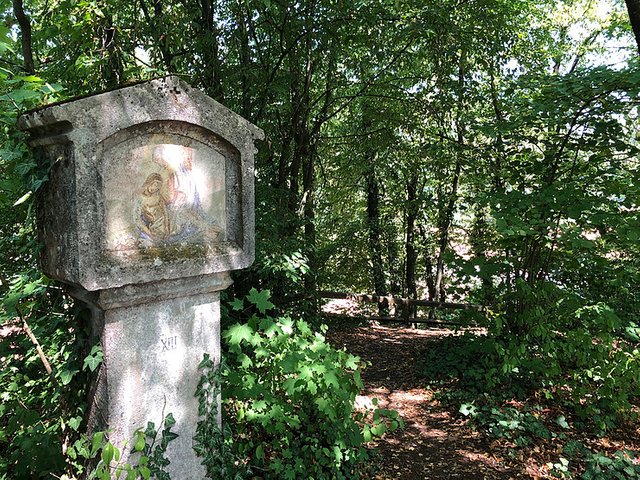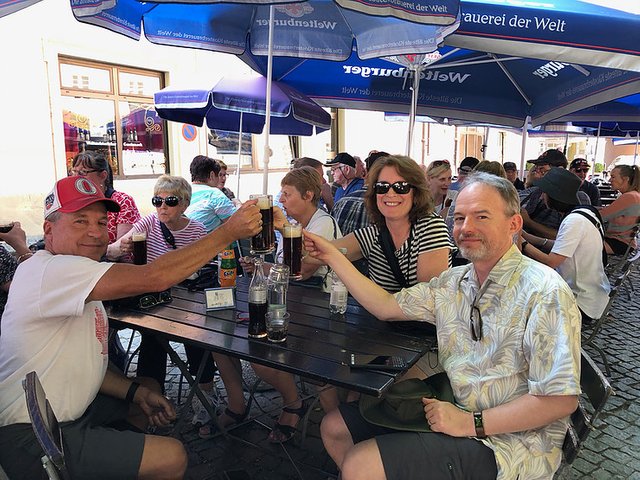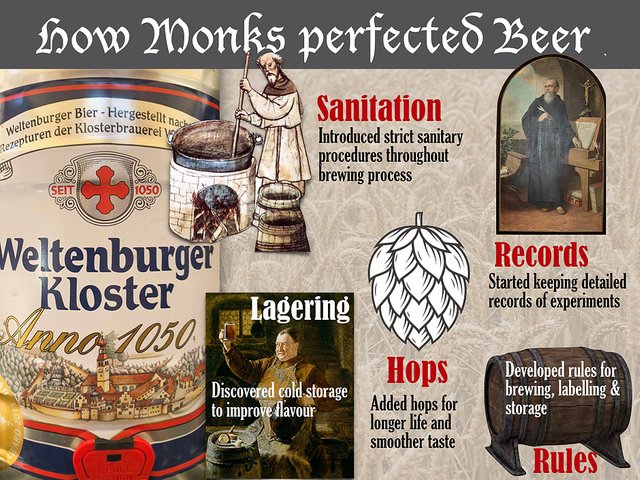How Monks Perfected Beer
In the history of brewing beer, monks have a special place in heaven. They found the perfect triangulation of spirituality, nutrition and self-sufficiency creating a product that many would call 'divine.'

A station of the cross behind Weltenburg Abbey.
During a recent trip to Bavaria, we visited the Weltenburg Abbey, (Weltenburger Klosterbrauerei) the oldest monastic brewery in the world. They proudly stamp 1050, the year of their founding, on all their bottles, cans and T-shirts. The oldest monastic brewery claim is hotly disputed by another Bavarian monastery, Weihenstephan Abbey, who say they got going ten years earlier in 1040.
What can't be argued though, is that monks revolutionized beer-making, and to this day the beers the monastic breweries produce are among the finest in the world. I can attest to the creamy texture of the Weltenburger Dunkel we sampled. It was nutty brown, and really earthy - but still very refreshing.
Sipping from a tall glass stein in their beer garden overlooking the Danube, I wondered what drove monks to become such master brewers? With a little research, I discovered some of the reasons.
By the way, if you travel to Northern Europe, you may want to spend a few hours exploring a monastic brewery. You get to absorb history and beer at the same time. And maybe stay for lunch. All in one stop!

Toasting the work of the Monks with friends during a visit to Weltenburg Abbey,
A match made in heaven?
Let’s travel back in time to about 600 AD. You’re a monk, devoted to a life of monastic living, hidden away from the hustle and bustle of medieval temptations. You and your companions follow the Rules of St. Benedict. One of them states that to become a true monk you must “live by the work of your own hands.” You must also donate to the poor through the fruits of your labour and provide traveling pilgrims with food and drink.
Before long you realize that brewing beer will provide a means to live by St. Benedict’s rules. You consider this while you and your fellow monks down four litres of beer each day - for nutrition of course and during long periods of fasting.
In the Middle Ages beer was consumed widely across Europe. (Some things never change.) Back then it was safer to beer drink than water, but often not much better. Beer was made by women with whatever leftover food could be found in the house. It often turned rancid.
To become a true monk you must “live by the work of your own hands.”
One thing I heard constantly in Germany and Austria was that beer is ‘liquid bread.’ Monks must have realized this too. Since grain forms the backbone of beer, it was a source of safe, stored calories - about 150 per pint. A slice of bread might be less than half of that, around 70 calories. So, drink up.
Monks take beer to a new level
Monks saw great possibilities in a product they could make themselves, that would help sustain them, that could be sold to travellers and could also be offered to those in need. But first, they would have to take brewing to a higher level than was known in the Middle Ages. With a fervour even St. Benedict would bless, they began to experiment with beer-making, keeping detailed journals of what did and did not work.
Blessed innovations in beer making
Monks added wild hops to their brews, which helped balance the sweet flavours of the malt and more importantly, helped preserve the beer. The hops also gave the beer a nice thirst-quenching bitterness. I can vouch for this. Give me anything on a really hot day, as long as it’s a cold beer.
Monks also introduced a fastidious level of sanitary practices to their beer-making and developed detailed regulations for everything from brewing to labelling and storage.
Another interesting thing they discovered about brewing, was that you could run water through mash to get beer with various alcohol levels, selling the highest concentration, (5%) to travellers, drinking the second run (2.5%) themselves, and finally, squeezing a third run through for the poor and destitute, with less than a 1% alcohol punch.
Monks are also credited with coming up with the idea of ‘lagering’ or cold storing beer for better flavour, which in turn lead to pale, clean tasting Pilsners and a thousand TV commercials.

Fast forward almost 600 years and monks are still making beer, with some of their brews regarded as the best in the world. They also find talking about the beer they make can leads to deeper conversations of a spiritual nature with visitors to the monastery.
A match made in heaven indeed!